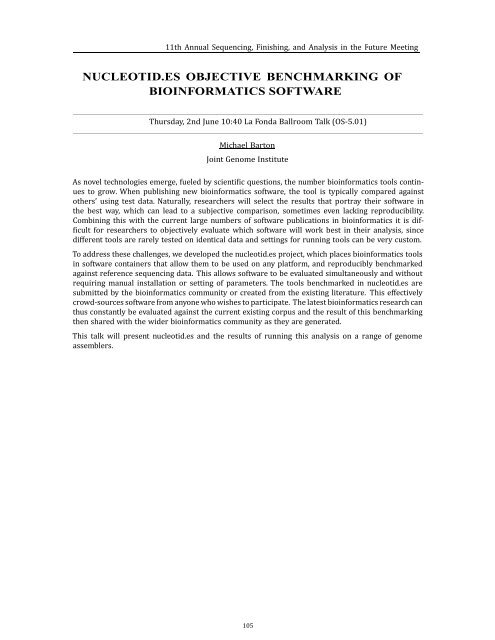Sequencing
SFAF2016%20Meeting%20Guide%20Final%203
SFAF2016%20Meeting%20Guide%20Final%203
Create successful ePaper yourself
Turn your PDF publications into a flip-book with our unique Google optimized e-Paper software.
11th Annual <strong>Sequencing</strong>, Finishing, and Analysis in the Future Meeting<br />
NUCLEOTID.ES OBJECTIVE BENCHMARKING OF<br />
BIOINFORMATICS SOFTWARE<br />
Thursday, 2nd June 10:40 La Fonda Ballroom Talk (OS‐5.01)<br />
Michael Barton<br />
Joint Genome Institute<br />
As novel technologies emerge, fueled by scientific questions, the number bioinformatics tools continues<br />
to grow. When publishing new bioinformatics software, the tool is typically compared against<br />
others’ using test data. Naturally, researchers will select the results that portray their software in<br />
the best way, which can lead to a subjective comparison, sometimes even lacking reproducibility.<br />
Combining this with the current large numbers of software publications in bioinformatics it is difficult<br />
for researchers to objectively evaluate which software will work best in their analysis, since<br />
different tools are rarely tested on identical data and settings for running tools can be very custom.<br />
To address these challenges, we developed the nucleotid.es project, which places bioinformatics tools<br />
in software containers that allow them to be used on any platform, and reproducibly benchmarked<br />
against reference sequencing data. This allows software to be evaluated simultaneously and without<br />
requiring manual installation or setting of parameters. The tools benchmarked in nucleotid.es are<br />
submitted by the bioinformatics community or created from the existing literature. This effectively<br />
crowd‐sources software from anyone who wishes to participate. The latest bioinformatics research can<br />
thus constantly be evaluated against the current existing corpus and the result of this benchmarking<br />
then shared with the wider bioinformatics community as they are generated.<br />
This talk will present nucleotid.es and the results of running this analysis on a range of genome<br />
assemblers.<br />
105


